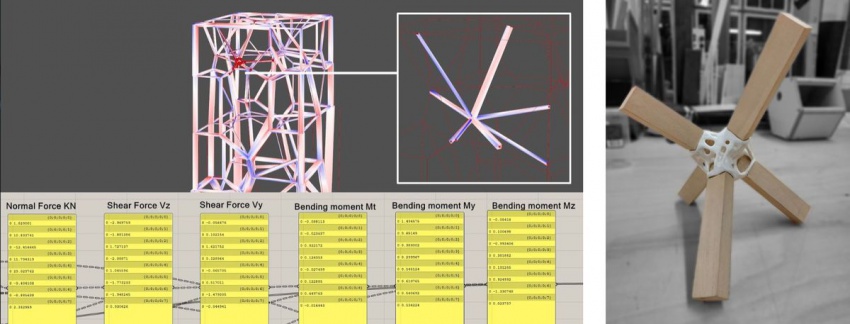Difference between revisions of "2022MSc2DD"
(→MSc 2 UF (BK-CiTG-EWI-3ME) 2022: Interactive Furniture) |
|||
| (One intermediate revision by one user not shown) | |||
| Line 2: | Line 2: | ||
=='''MSc 2 UF (BK-CiTG-EWI-3ME) 2022: Interactive Furniture'''== | =='''MSc 2 UF (BK-CiTG-EWI-3ME) 2022: Interactive Furniture'''== | ||
| + | <br> | ||
[[File:HC.jpeg | 850px]] | [[File:HC.jpeg | 850px]] | ||
<br><br> | <br><br> | ||
| + | The MSc 2 course on Interactive Furniture (IF) will focus on the development of parametric designs for robotically produced and assembled furniture using 3D printed nodes and wood elements of variable size. The design takes functional, structural, material, and operational aspects into account. It integrates sensor-actuators into the furniture enabling communication with users via sounds, lights, etc. and web-based apps, respectively. The focus will be on two main aspects of the design: (1) Computational design and robotic assembly (workshop) and (2) Computational design, robotic production, assembly, and user-driven interaction based on sensor-actuator operation (studio). The MSc 2 course is accompanied by a symposium (http://www.roboticbuilding.eu/research/publications/symposia/) with international guests and is taught in collaboration with the faculties CitG, EWI, and 3ME. Prototyping is implemented with support of TU Library acting as client and Dutch Growth Factory and 3D Robot Printing contributing in-kind as industrial partner. | ||
| + | |||
| + | <br> | ||
=='''Groups'''== | =='''Groups'''== | ||
Latest revision as of 15:58, 19 January 2024
MSc 2 UF (BK-CiTG-EWI-3ME) 2022: Interactive Furniture

The MSc 2 course on Interactive Furniture (IF) will focus on the development of parametric designs for robotically produced and assembled furniture using 3D printed nodes and wood elements of variable size. The design takes functional, structural, material, and operational aspects into account. It integrates sensor-actuators into the furniture enabling communication with users via sounds, lights, etc. and web-based apps, respectively. The focus will be on two main aspects of the design: (1) Computational design and robotic assembly (workshop) and (2) Computational design, robotic production, assembly, and user-driven interaction based on sensor-actuator operation (studio). The MSc 2 course is accompanied by a symposium (http://www.roboticbuilding.eu/research/publications/symposia/) with international guests and is taught in collaboration with the faculties CitG, EWI, and 3ME. Prototyping is implemented with support of TU Library acting as client and Dutch Growth Factory and 3D Robot Printing contributing in-kind as industrial partner.
Groups
Prototyping
Computational Design
Files used during U/IF development: https://1drv.ms/u/s!Ap2HKg-FwKlAks06hDZktiCp3GocHA?e=hjerFm, https://1drv.ms/u/s!Ap2HKg-FwKlAku8pbVxqtAG59UQCQg?e=8cLTwq, and https://1drv.ms/u/s!Ap2HKg-FwKlAku8aKplOeYRI82FzNQ?e=1vKcHL
File TU Delft library: https://drive.google.com/file/d/1aKPrjr70Rg-8L0OqZiKlh6qfO6U02Lj5/view
Tutorials
Grasshopper Part 1 (workshop 22): https://drive.google.com/file/d/1fyfdGbfD9xPGMWtaJ3Yd2YyctjqHIwuj/view
Grasshopper Part 2 (workshop 22): https://drive.google.com/file/d/1zfPRnEY_FXBJ0o5fhag-KPMnhT3JVlFd/view
Grasshopper Part 3 (workshop 22): https://drive.google.com/file/d/1lyhiEcEzEf5Brue3_7pkySuoGIxWkhmc/view
Grasshopper Part 4 (workshop 22): https://drive.google.com/file/d/1SxvmKJYoehVZQENwCwOyKtqdG0bFBXAg/view
3dm file
gh file
Grasshopper (workshop 21): http://uf.roboticbuilding.eu/index.php/W4:Online
Grasshopper (workshop 20 incl. acoustic simulation): http://cs.roboticbuilding.eu/index.php/2019W2:Page4
Robotic toolpath generation Part 1: https://www.youtube.com/watch?v=KtN4hwrXNe4
Robotic toolpath generation Part 2: https://www.youtube.com/watch?v=I_LPoZTmq6Y
Robotic milling tutorial https://drive.google.com/file/d/1w-PCpOzNc1z5gt3dcc0eCIIuYZTGzYlr/view
3dm file
gh file
Downloads
Needed software packages: Rhino 6 and 7 including Grasshopper. For info and support on how to set up Rhino please go to @hoc: https://adhok.bk.tudelft.nl/wp-content/uploads/2021/07/Rhino7-2.0-Windows-EN.pdf
Rhinoceros 6 and 7: Download from the Brightspace website. Follow the instructions here: https://adhok.bk.tudelft.nl/2021/changes-in-obtaining-tu-rhino-licenses/
Grasshopper: Download from http://www.grasshopper3d.com/.
Grasshopper is included and pre-installed in Rhino 6 and 7. For the installation of plugins in Grasshopper: Open Grasshopper and choose File > Special Folders > Components folder. Save any plugin GHA file there. Right-click the file > Properties > make sure there is no "blocked" text. Restart Rhino and Grasshopper.
Basic Tutorials: http://www.rhino3d.com/tutorials
- http://vimeo.com/58212839 (must watch & practice, about 5 minutes)
- http://vimeo.com/82431575 (must watch & practice, about 1 hour)
- https://vimeo.com/28175502 (must watch & practice, about 2 hours)
Plug-Ins:
- Install Weaverbird for Rhino 6 http://www.giuliopiacentino.com/weaverbird/ (tools for meshes)
- Install Ladybug and Honeybee plugin for Rhino 6: https://www.food4rhino.com/app/ladybug-tools (solar analysis tools)
- Install Karamba: https://www.karamba3d.com/ for the Karamba plugin for grasshopper for structural analysis and calculations.
- Install Kangaroo: Download the most current version as well as version 0.099: https://www.food4rhino.com/app/kangaroo-physics
- Install others: https://www.food4rhino.com/app/anemone, https://www.food4rhino.com/app/pufferfish, https://www.food4rhino.com/app/human, https://www.food4rhino.com/app/meshedit, https://www.food4rhino.com/app/elefront, https://www.food4rhino.com/app/lunchbox, https://www.food4rhino.com/app/nudibranch, https://www.food4rhino.com/app/parakeet